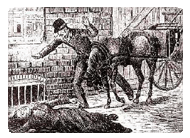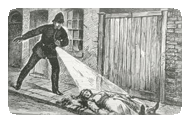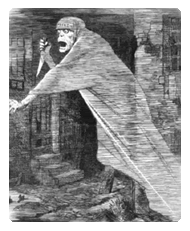Saturday, April 24, 2010
Carl Panzram
I just finished the book Panzram: A Journal of Murder edited by Thomas Gaddis and James Long. The intro is by Harold Schechter, one of my favorite authors.
The Panzram book is mostly the letters and other writings of Panzram to a guard named Lesser that Panzram struck up a friendship with during one stint in prison. Panzram's life is fascinating, and the brutality and torture he experienced while in prison, whatever his innate failings as a member of society, could not have helped but make him a worse person outside of prison. Panzram's writings are striking because, while he lacked a formal education after about age 11, he was conversant on many theorists and writers of the time, and even tried to get into Kant during his last incarceration. He suffered no delusions as to his lot in life and blamed himself for his crimes, but he did at least raise the issue of prison brutality as counterintuitive to rehabilitation, which it took us many years to embrace. Panzram spent about 20 of his 38 years behind bars, and all that time did was make him more vicious and more vengeful toward anyone and everyone.
All that said, he was a particularly brutal and sadistic psychopath of the kind that makes us wonder if there isn't another class of people besides human amongst us--those without ability to co-exist with society and doomed to always run afoul of what society demands until paying the ultimate price, with no hope of redemption. What Panzram forces us to do is to question whether these people merely exist alongside us or are they manufactured by deficiencies in upbringing, contradictory societal teachings, and other environmental factors. In short, he is the ultimate test case for nature versus nurture.
A movie was being cast about Panzram's life, with a website looking for actors to fill the roles of Panzram at various stages of his life, but it was last updated in 2008. This would make a great movie if done right.
The Panzram book is mostly the letters and other writings of Panzram to a guard named Lesser that Panzram struck up a friendship with during one stint in prison. Panzram's life is fascinating, and the brutality and torture he experienced while in prison, whatever his innate failings as a member of society, could not have helped but make him a worse person outside of prison. Panzram's writings are striking because, while he lacked a formal education after about age 11, he was conversant on many theorists and writers of the time, and even tried to get into Kant during his last incarceration. He suffered no delusions as to his lot in life and blamed himself for his crimes, but he did at least raise the issue of prison brutality as counterintuitive to rehabilitation, which it took us many years to embrace. Panzram spent about 20 of his 38 years behind bars, and all that time did was make him more vicious and more vengeful toward anyone and everyone.
All that said, he was a particularly brutal and sadistic psychopath of the kind that makes us wonder if there isn't another class of people besides human amongst us--those without ability to co-exist with society and doomed to always run afoul of what society demands until paying the ultimate price, with no hope of redemption. What Panzram forces us to do is to question whether these people merely exist alongside us or are they manufactured by deficiencies in upbringing, contradictory societal teachings, and other environmental factors. In short, he is the ultimate test case for nature versus nurture.
A movie was being cast about Panzram's life, with a website looking for actors to fill the roles of Panzram at various stages of his life, but it was last updated in 2008. This would make a great movie if done right.


















Hi Lavaughn, thanks for becoming a follower of my blog! There is so much to learn about the 19th century, it makes my head spin. I'd never heard of Carl Panzram, but his personal story is fascinating. He would make an incredible film character. You've probably mentioned this dozens of times on your blog, but what did you think of 'From Hell'? I'm not sure if Prince Albert was in any way connected to the case. A Discovery Channel show I watched on Ripper hinted that he was probably a Whitechapel native, since he seemed really comfortable around the streets and women. He was probably as inconspicuous as it gets. They say serial killers are just like normal people ... because they have learned to be ...
Hi Meg,
I'm sorry it's taken me so long to get back to you! The semester was ending and grading got me behind.
I really liked From Hell for atmosphere, but I think it would have been more interesting had they followed the graphic novel more and relied less on the tired Royal Conspiracy. I agree--he was some nameless, faceless Whitechapel denizen who happened to elude an ill-equipped police force. I really enjoy your blog, and I'm happy to meet someone else who is so interested in all the aspects of the 19th Century!
Post a Comment
<< Home